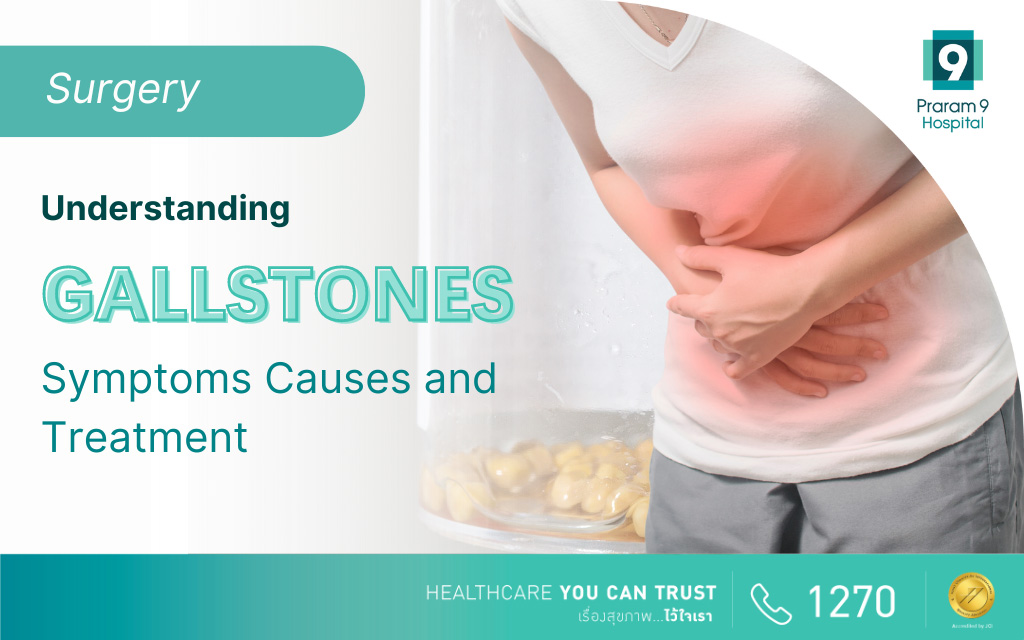
Understanding Gallstones: Symptoms, Causes, and Treatment
Learn about gallstones, including causes, symptoms, risk factors, and treatments

Learn about gallstones, including causes, symptoms, risk factors, and treatments
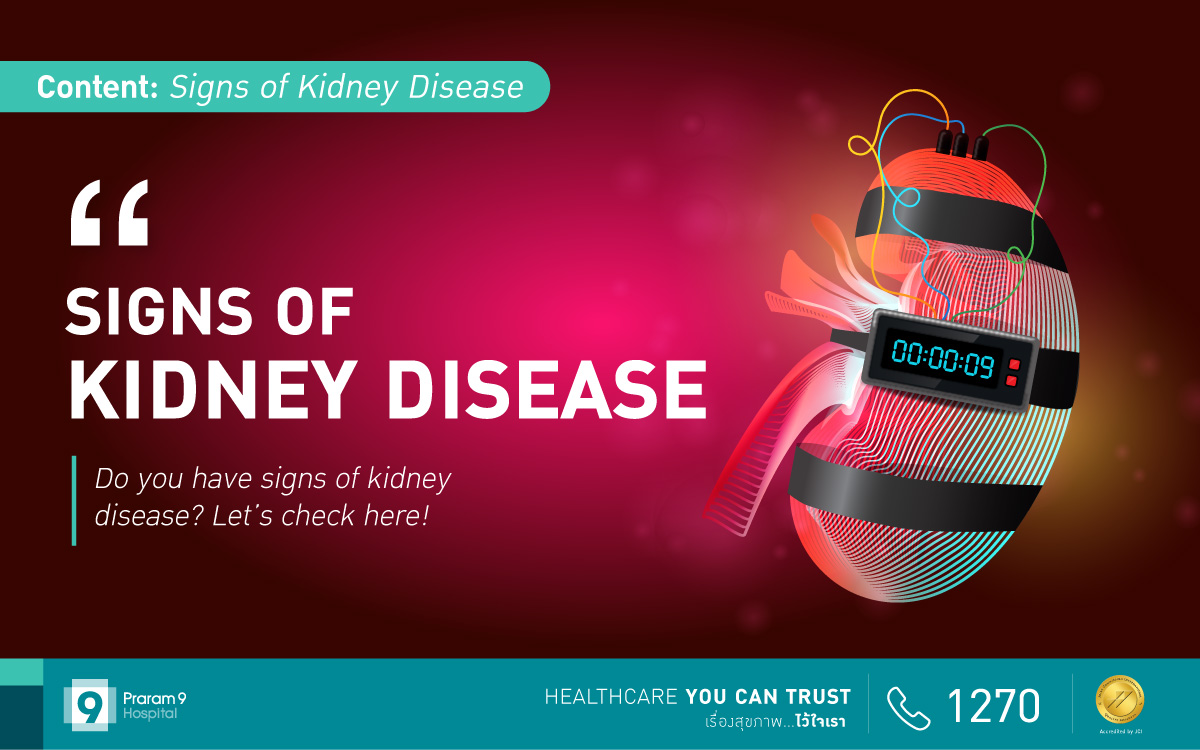
Due to the fact that kidney disease has multiple types, the symptoms of patients can vary. Kidney diseases can also be further classified based on the characteristics of symptoms and the affected areas.
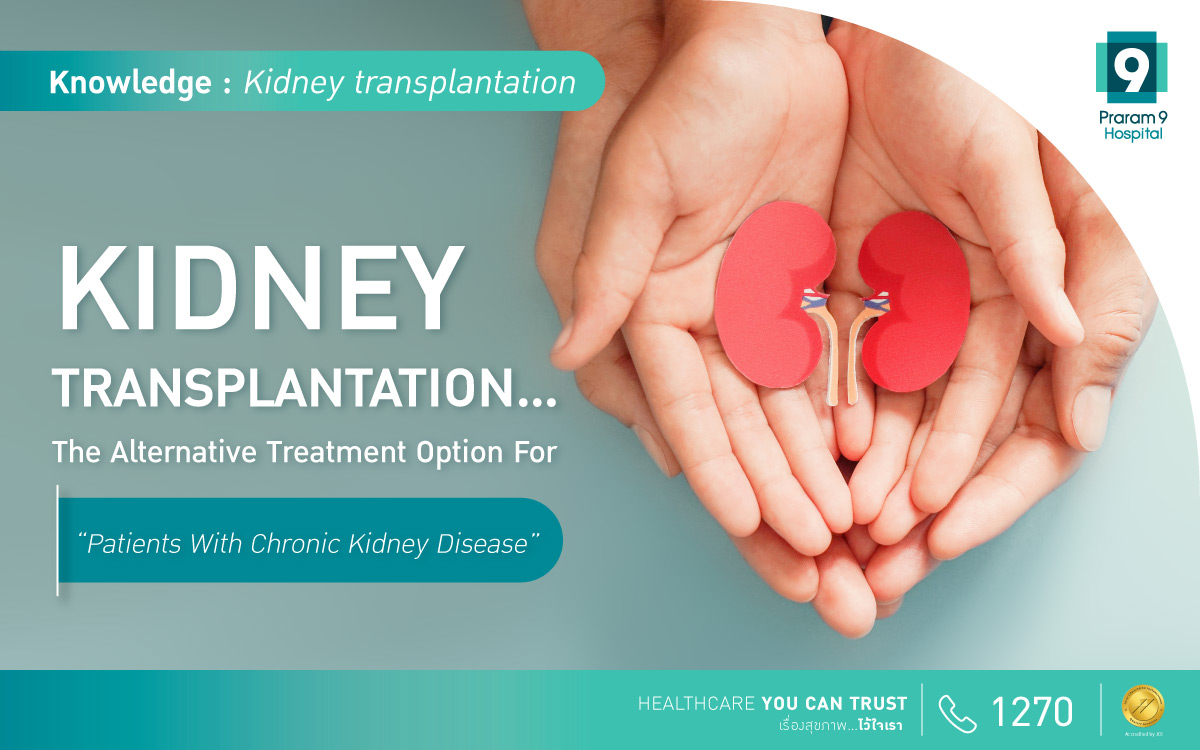
Managing chronic kidney disease effectively is crucial to prevent the buildup of toxic substances in the body and avoid further complications. Kidney transplantation is currently the most effective treatment for end-stage renal disease, offering patients a high chance of regaining a good quality of life.
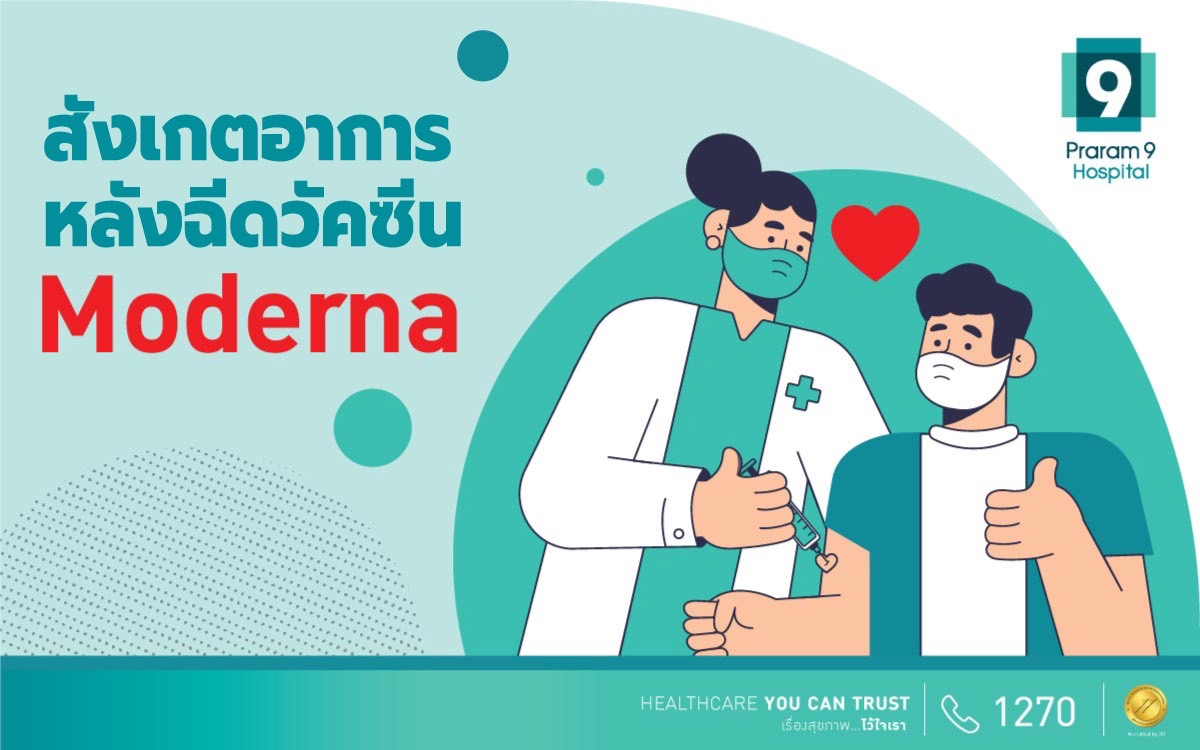
General or mild adverse symptoms (In general, these symptoms usually resolve within 2 days)Low grade feverHeadacheMuscle, joint or general achesFatigue
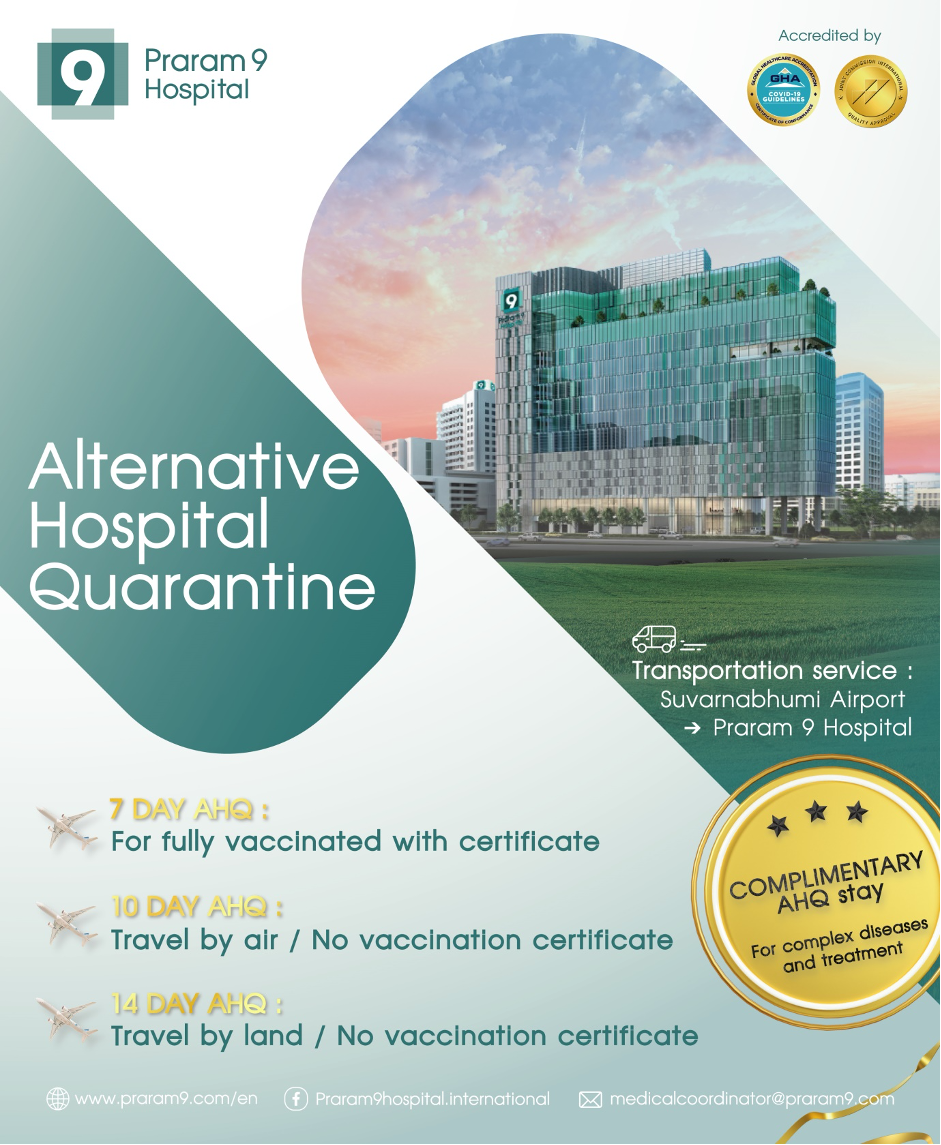
All AHQ stays are inclusive of 2 RT-PCR tests done on the first day and day before discharge. Praram 9 hospital has achieved the Global Healthcare Accreditation (GHA)
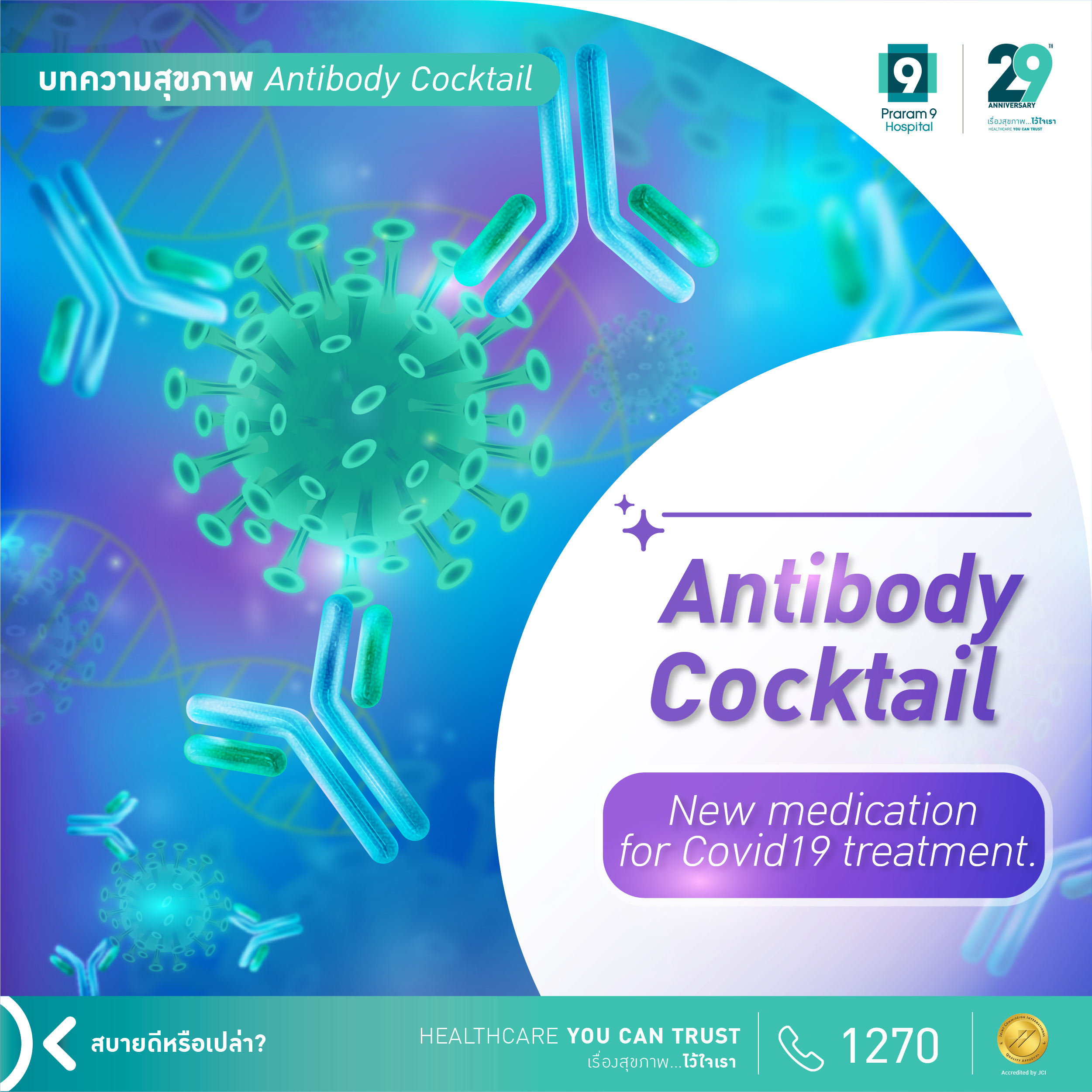
The Antibody Cocktail (also known as Regeneron or Regen-Cov) is a novel treatment for COVID19 infection. It has been approved in many countries including USA, India, Japan, England and Thailand. In July 2021, The Thai FDA has issued an emergency use authorization (EUA) for the antibody cocktail (casirivimab and imdevimab) to be administered for the treatment of mild to moderate COVID-19 in adults and pediatric patients (12 years of age or older weighing at least 40 kilograms [about 88 pounds]) with positive results of direct SARS-CoV-2 viral testing and who are at high risk for progressing to severe COVID-19. This includes those who are 65 years of age or older or who have certain chronic medical conditions. The antibody cocktail of casirivimab and imdevimab significantly reduced the risk of hospitalisation or death by 70% according to the REGEN-COV™ Phase III trial. This could be a specific and novel treatment to prevent COVID19 pneumonia progression and death. INDEX: What is “Antibody Cocktail” What is the difference between “Antibody Cocktail”, favipiravir and COVID-19 vaccines? How does the Antibody Cocktail work? Who Is Eligible to Receive Anti-SARS-CoV-2 Monoclonal Antibodies? Difference between convalescent plasma and Antibody Cocktail Antibody Cocktail Efficacy Contraindication, precaution and side effects of Antibody Cocktail Summary What is “Antibody Cocktail” Antibody Cocktail or “REGEN-COV” is a cocktail of two monoclonal antibodies (casirivimab with imdevimab) that was designed specifically to block infectivity of SARS-CoV-2, the virus that causes COVID-19. The antibodies bind to the critical receptor
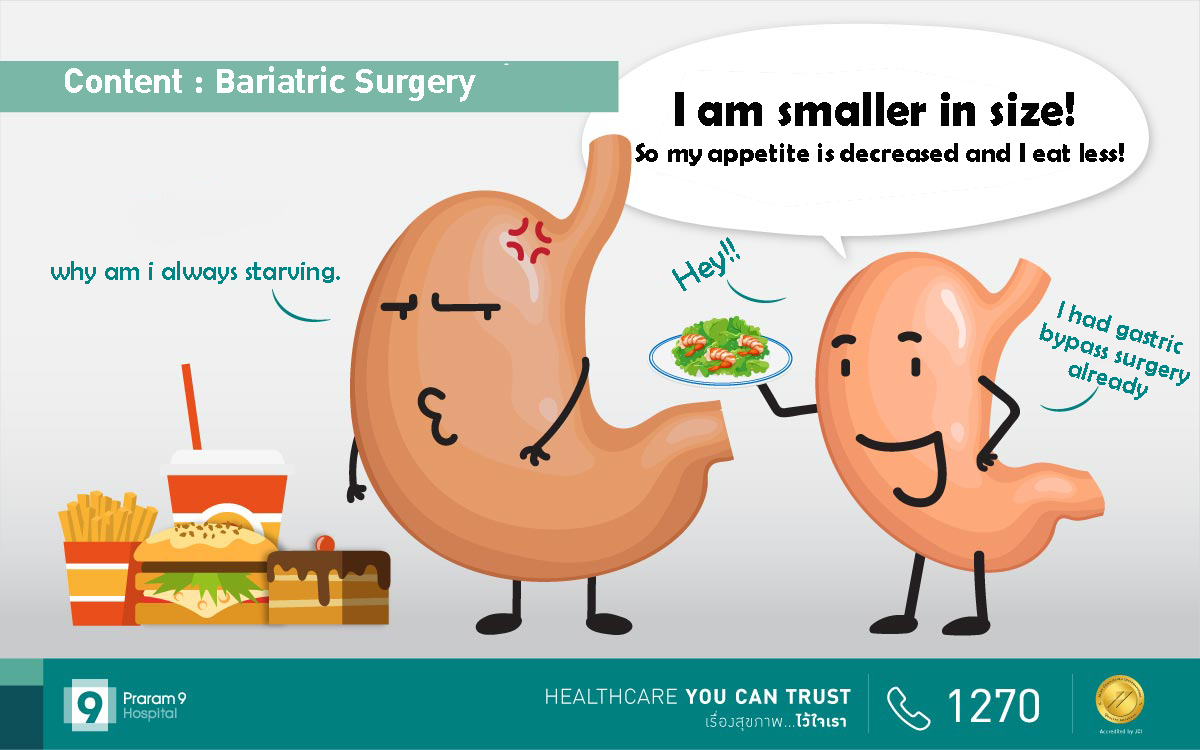
Obesity has become an epidemic of global proportions. Many people are living with a high risk of dying from complications of their obese status, or living with a disability and/or a psychosocial stigma that prevents them from enjoying a satisfying life. The general recommendation to morbidly obese patients to lose 10% of their initial body weight, is well known to have a positive impact and therefore reducing their cardiovascular risk. Conventional obesity management such as diet control and exercise has limitations in patients with morbid obesity. Weight loss surgery, therefore, is another option to lose weight in morbidly obese patients. Weight loss surgery, also known as bariatric surgery, can lead to significant weight loss and help improve or even cure many obesity-related conditions, such as type 2 diabetes or high blood pressure. Content: What is bariatric surgery? Who is a candidate for weight loss surgery? How to diagnose obesity? How does obesity harm your health? Why do conventional lifestyle interventions not help in morbid obesity? How many types of bariatric surgery are there? Dietary guidelines after bariatric surgery Complication of bariatric surgery Is it possible to gain back weight after bariatric surgery? Summary What is bariatric surgery? Gastric bypass and other weight-loss surgeries — known collectively as bariatric surgery — involve making changes to your digestive system to help you lose weight. Bariatric surgery is done when diet and exercise haven’t worked or when you have serious health problems because of your weight. Some

Olympic Games and Injuries By Dr. Marcus Ng The Tokyo 2020 Olympics welcomed more than 10,000 athletes from all over the world, to participate in the various sports. In their quest for the ultimate achievement, all the athletes had to push themselves to the limit. We would like to congratulate all the winners, as well as participants for their hard work over the course of their journey. While we are proud of every single athlete, we must not forget the pain, sweat and tears that the athletes have shed in their quest for glory. The four-yearly Olympic Games is a grand event for athletes to pursue their dreams, but accidental injuries may sometimes occur, requiring the expertise of an Orthopedic surgeon. In training for and performing in the sports competitions of the Olympic Games, athletes can endure a variety of injuries that can lead to the development of chronic musculoskeletal issues. Tennis superstar and world number 1 Novak Djokovic had to bow out of the Olympic Games due to a shoulder injury. A severe knee injury nearly ended weightlifting bronze medalist Mikiko Ando’s Olympic journey, before it even began. Hong Kong swimmer Siobhan Haughey withdrew from the 50-meter free style semifinals of the due to a hip injury. Orthopedic surgeons keep athletes in motion and strive to educate patients on sport-specific injury prevention techniques that can support the highest degree of performance and ultimately reduce the occurrence of bone and
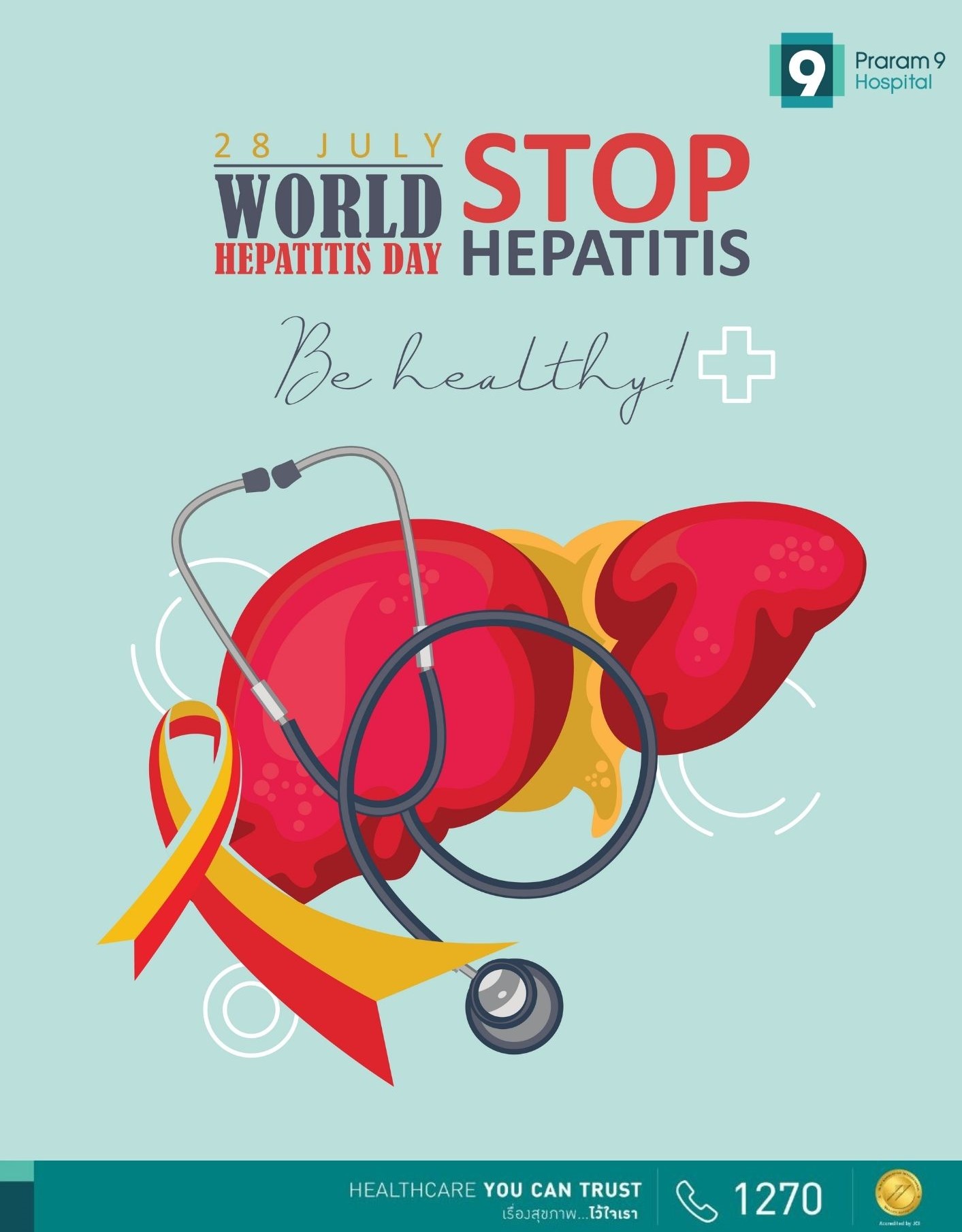
By Dr. Rapeepun Kalayavinai 28th July is World Hepatitis Day. Understanding the different forms of hepatitis, who is at risk and how it can be prevented and treated can be valuable to protect you and your loved ones from the disease. Hepatitis is an inflammation of the liver that is caused by a variety of infectious viruses and noninfectious agents leading to a range of health problems, some of which can be fatal. There are five main strains of the hepatitis virus, referred to as types A, B, C, D and E. To this day, viral hepatitis remains a major public health problem in Thailand. Chronic infection with hepatitis B and C viruses are the leading causes of chronic liver diseases, including cirrhosis and hepatocellular carcinoma (HCC). Symptoms of viral hepatitis Symptoms and severity of viral hepatitis varies. Short-term (acute) hepatitis often has no noticeable symptoms, so you may not realise you have it. If symptoms do develop, they can include: Long-term (chronic) hepatitis also may not have any obvious symptoms until the liver stops working properly (liver failure) and may only be picked up during blood tests. In the later stages, chronic hepatitis can cause liver cirrhosis, or scarring of the liver, which manifest as jaundice, swelling in the legs, ankles and feet, confusion, and blood in your stools or vomit. Some people with chronic hepatitis may go on to develop liver cancer. What you need to know about
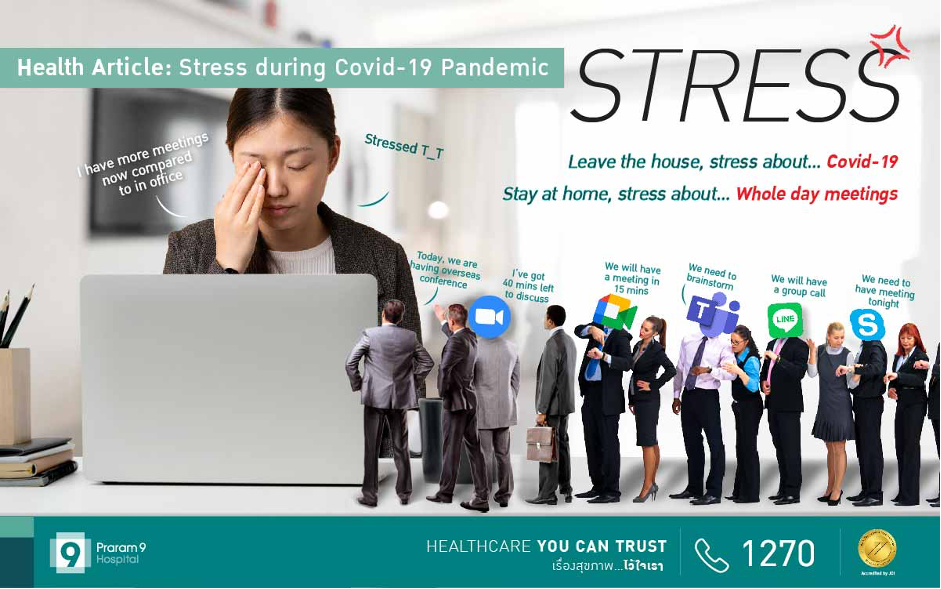
Stress Management during the Covid-19 Pandemic Dr. Dujrudee Apiwong The Covid-19 pandemic has had a major effect on our lives. Many of us, both adults and children, are facing challenges that can be stressful and overwhelming. Learning to cope with stress in a healthy way will allow you, the people you care about, and those around you become more resilient. Contents How Covid-19 affects the mental health Introduction to stress 3 Impacts of stress Depression Strategies to manage stress Sustainable stress management techniques during covid-19 pandemics Summary How covid-19 affects the mental health We may be aware of the infectiousness, morbidity and mortality of Covid-19, but it is also known to have significant negative mental impact on those involved directly or indirectly. For patients diagnosed with Covid-19, these are some of the emotional stress they may face: Guilt after testing positive as well as anxiety about spreading the illness to others Stress after being isolated. Anxiety and worry due to uncertainty about treatment and complications from infection. Impact of COVID-19 on Public Mental Health People may also be stressed despite not being infected by Covid-19 due to several reasons: From the news to social media, a lot of information is circulating about the coronavirus. Some is true, but much of it may be misinformed or only partly correct, especially as information rapidly changes. The inability to understand and misinformation can lead to stress and anxiety. Income insecurity and fear of losing

Learn about gallstones, including causes, symptoms, risk factors, and treatments

Due to the fact that kidney disease has multiple types, the symptoms of patients can vary. Kidney diseases can also be further classified based on the characteristics of symptoms and the affected areas.

Managing chronic kidney disease effectively is crucial to prevent the buildup of toxic substances in the body and avoid further complications. Kidney transplantation is currently the most effective treatment for end-stage renal disease, offering patients a high chance of regaining a good quality of life.

General or mild adverse symptoms (In general, these symptoms usually resolve within 2 days)Low grade feverHeadacheMuscle, joint or general achesFatigue

All AHQ stays are inclusive of 2 RT-PCR tests done on the first day and day before discharge. Praram 9 hospital has achieved the Global Healthcare Accreditation (GHA)

The Antibody Cocktail (also known as Regeneron or Regen-Cov) is a novel treatment for COVID19 infection. It has been approved in many countries including USA, India, Japan, England and Thailand. In July 2021, The Thai FDA has issued an emergency use authorization (EUA) for the antibody cocktail (casirivimab and imdevimab) to be administered for the treatment of mild to moderate COVID-19 in adults and pediatric patients (12 years of age or older weighing at least 40 kilograms [about 88 pounds]) with positive results of direct SARS-CoV-2 viral testing and who are at high risk for progressing to severe COVID-19. This includes those who are 65 years of age or older or who have certain chronic medical conditions. The antibody cocktail of casirivimab and imdevimab significantly reduced the risk of hospitalisation or death by 70% according to the REGEN-COV™ Phase III trial. This could be a specific and novel treatment to prevent COVID19 pneumonia progression and death. INDEX: What is “Antibody Cocktail” What is the difference between “Antibody Cocktail”, favipiravir and COVID-19 vaccines? How does the Antibody Cocktail work? Who Is Eligible to Receive Anti-SARS-CoV-2 Monoclonal Antibodies? Difference between convalescent plasma and Antibody Cocktail Antibody Cocktail Efficacy Contraindication, precaution and side effects of Antibody Cocktail Summary What is “Antibody Cocktail” Antibody Cocktail or “REGEN-COV” is a cocktail of two monoclonal antibodies (casirivimab with imdevimab) that was designed specifically to block infectivity of SARS-CoV-2, the virus that causes COVID-19. The antibodies bind to the critical receptor

Obesity has become an epidemic of global proportions. Many people are living with a high risk of dying from complications of their obese status, or living with a disability and/or a psychosocial stigma that prevents them from enjoying a satisfying life. The general recommendation to morbidly obese patients to lose 10% of their initial body weight, is well known to have a positive impact and therefore reducing their cardiovascular risk. Conventional obesity management such as diet control and exercise has limitations in patients with morbid obesity. Weight loss surgery, therefore, is another option to lose weight in morbidly obese patients. Weight loss surgery, also known as bariatric surgery, can lead to significant weight loss and help improve or even cure many obesity-related conditions, such as type 2 diabetes or high blood pressure. Content: What is bariatric surgery? Who is a candidate for weight loss surgery? How to diagnose obesity? How does obesity harm your health? Why do conventional lifestyle interventions not help in morbid obesity? How many types of bariatric surgery are there? Dietary guidelines after bariatric surgery Complication of bariatric surgery Is it possible to gain back weight after bariatric surgery? Summary What is bariatric surgery? Gastric bypass and other weight-loss surgeries — known collectively as bariatric surgery — involve making changes to your digestive system to help you lose weight. Bariatric surgery is done when diet and exercise haven’t worked or when you have serious health problems because of your weight. Some

Olympic Games and Injuries By Dr. Marcus Ng The Tokyo 2020 Olympics welcomed more than 10,000 athletes from all over the world, to participate in the various sports. In their quest for the ultimate achievement, all the athletes had to push themselves to the limit. We would like to congratulate all the winners, as well as participants for their hard work over the course of their journey. While we are proud of every single athlete, we must not forget the pain, sweat and tears that the athletes have shed in their quest for glory. The four-yearly Olympic Games is a grand event for athletes to pursue their dreams, but accidental injuries may sometimes occur, requiring the expertise of an Orthopedic surgeon. In training for and performing in the sports competitions of the Olympic Games, athletes can endure a variety of injuries that can lead to the development of chronic musculoskeletal issues. Tennis superstar and world number 1 Novak Djokovic had to bow out of the Olympic Games due to a shoulder injury. A severe knee injury nearly ended weightlifting bronze medalist Mikiko Ando’s Olympic journey, before it even began. Hong Kong swimmer Siobhan Haughey withdrew from the 50-meter free style semifinals of the due to a hip injury. Orthopedic surgeons keep athletes in motion and strive to educate patients on sport-specific injury prevention techniques that can support the highest degree of performance and ultimately reduce the occurrence of bone and

By Dr. Rapeepun Kalayavinai 28th July is World Hepatitis Day. Understanding the different forms of hepatitis, who is at risk and how it can be prevented and treated can be valuable to protect you and your loved ones from the disease. Hepatitis is an inflammation of the liver that is caused by a variety of infectious viruses and noninfectious agents leading to a range of health problems, some of which can be fatal. There are five main strains of the hepatitis virus, referred to as types A, B, C, D and E. To this day, viral hepatitis remains a major public health problem in Thailand. Chronic infection with hepatitis B and C viruses are the leading causes of chronic liver diseases, including cirrhosis and hepatocellular carcinoma (HCC). Symptoms of viral hepatitis Symptoms and severity of viral hepatitis varies. Short-term (acute) hepatitis often has no noticeable symptoms, so you may not realise you have it. If symptoms do develop, they can include: Long-term (chronic) hepatitis also may not have any obvious symptoms until the liver stops working properly (liver failure) and may only be picked up during blood tests. In the later stages, chronic hepatitis can cause liver cirrhosis, or scarring of the liver, which manifest as jaundice, swelling in the legs, ankles and feet, confusion, and blood in your stools or vomit. Some people with chronic hepatitis may go on to develop liver cancer. What you need to know about

Stress Management during the Covid-19 Pandemic Dr. Dujrudee Apiwong The Covid-19 pandemic has had a major effect on our lives. Many of us, both adults and children, are facing challenges that can be stressful and overwhelming. Learning to cope with stress in a healthy way will allow you, the people you care about, and those around you become more resilient. Contents How Covid-19 affects the mental health Introduction to stress 3 Impacts of stress Depression Strategies to manage stress Sustainable stress management techniques during covid-19 pandemics Summary How covid-19 affects the mental health We may be aware of the infectiousness, morbidity and mortality of Covid-19, but it is also known to have significant negative mental impact on those involved directly or indirectly. For patients diagnosed with Covid-19, these are some of the emotional stress they may face: Guilt after testing positive as well as anxiety about spreading the illness to others Stress after being isolated. Anxiety and worry due to uncertainty about treatment and complications from infection. Impact of COVID-19 on Public Mental Health People may also be stressed despite not being infected by Covid-19 due to several reasons: From the news to social media, a lot of information is circulating about the coronavirus. Some is true, but much of it may be misinformed or only partly correct, especially as information rapidly changes. The inability to understand and misinformation can lead to stress and anxiety. Income insecurity and fear of losing